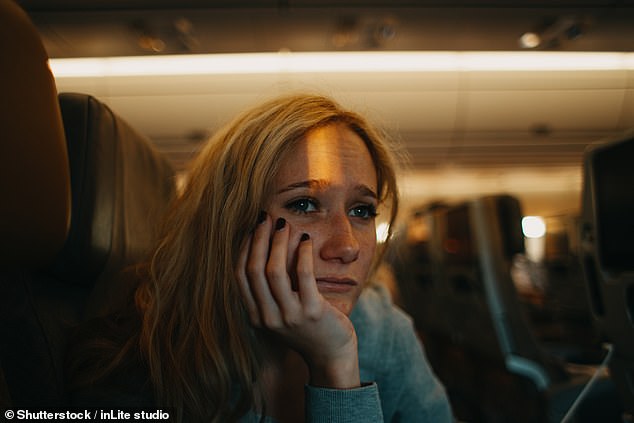Table of Contents
Rawdogging is the act of spending an airplane ride absorbed in your own thoughts, with no outside entertainment.
And videos of passengers filming themselves doing so have recently gone viral.
TikTok user @westwashere He boasted of having endured seven- and nine-hour flights “just looking at maps and airspeed” – and Dalton Roe (@deathroe90) stated that when he eats rawdog, he doesn’t even eat.
He captioned his video: “Just got on a flight from Orlando to LA, no water, no snacks, no music or entertainment, seat completely upright. The power of the mind is limitless.”
Sounds like a nightmare? Psychologists reveal that this practice actually has many benefits, from “sparking creativity” to “reducing anxiety.”

Flight “rawdogging” is the act of spending a plane ride absorbed in your own thoughts. TikTok user @westwashere (left) boasted of enduring seven- and nine-hour flights “just looking at maps and air speed.” Psychologists say the practice has significant mental health benefits

Dr Sandi Mann, pictured, a psychology lecturer at the University of Central Lancashire, shared the benefits of rawdogging flights with MailOnline
Dr Sandi Mann, a psychology lecturer at the University of Central Lancashire, is an expert in the science of boredom, wellbeing and emotions. She shared the benefits of rawdogging with MailOnline, explaining: “The new craze for rawdogging may seem like a fun and slightly odd trend. However, there are some real mental health benefits to be gained from it.
‘When we give ourselves time away from our phones or other stimuli, we allow our minds to wander, and this can help generate new ideas and creativity.
‘Having absolutely nothing to do or distract ourselves with causes us to experience low levels of stimulation.
“The feeling of being understimulated, or boredom as it is often called, can be uncomfortable and something we try to avoid. When we force ourselves to stay in that state, our mind starts to look inward.”
Benefits of low stimulation
The professor continues: ‘Our brains can provide the neural stimulation that is missing from the external environment. The activation of networks and connections, the leap from ideas to images and thoughts, becomes less conscious. We stop controlling where our brain goes. This allows us to see things in new ways and tap into new insights.
‘I once carried out an experiment at the University of Central Lancashire which involved taking people off the street and putting them in a room with no stimulation whatsoever, such as music, phones or even anything to look at.
‘At first, participants found the experience uncomfortable and were anxious about doing something, but they eventually relaxed and found it reassuring.
“Taking time to let our minds wander allows us to daydream; both processes are the catalyst for creativity. During this time, we come up with more creative ideas and different approaches to solving problems. It also provides us with much-needed downtime away from the stresses of everyday life.”
How to make the most of flights

“Taking time to let our brains wander allows us to daydream, which is a catalyst for creativity,” says Dr. Sandi Mann (file image)
Sandi explains that air travel is a good time to try out low-stimulation scenarios.
She notes: ‘A flight provides us with the perfect time to take a much-needed break from the hustle and bustle of our everyday lives. Putting our phones on airplane mode removes the need to keep an eye on any messages or notifications, so it’s a great excuse to put the screen aside completely and focus on our thoughts.
“While it may be difficult at first to sit on a plane and do nothing, over time we will begin to relax. It takes some patience, but it can be hugely beneficial.”
The psychologist adds: “In fact, I would recommend that we all spend some time regularly letting our minds wander, rather than just waiting for our next flight.
“Slowness and quietness force us to experiment more or try new ideas that we wouldn’t normally think of, and this leads to more creativity. Hopefully this trend can inspire more people to give it a try!”

Dr Daniel Glazer, pictured, is a clinical psychologist with a special interest in trauma. He says rawdogging can reduce anxiety levels.
Reduce stress and anxiety
Dr. Daniel Glazer, a clinical psychologist with a special interest in trauma, adds that “intentionally engaging in mindfulness practices—simply being aware of the present moment, without distractions—is clinically proven to reduce stress and anxiety levels.”
He told MailOnline that rawdogging is “a kind of impromptu meditation session”.
And he continues: “It’s definitely not for everyone, as for some the thought of being trapped in their own head for hours is their worst nightmare. But this forced introspection could provide an opportunity to deal with thoughts, emotions and self-awareness that our minds typically avoid or suppress when inundated with distractions.
‘While it may feel uncomfortable, disconnecting from stimuli can offer certain psychological benefits similar to mindfulness practices.’
Dr Sandi Mann, Senior Lecturer in Psychology at the University of Central Lancashire, is the author of The Science of Boredom (Little Brown).
Dr. Daniel Glazer is a co-founder of several healthcare technology platforms including Therapy rooms in the UKthe fastest growing directory of treatment rooms, wellness spaces and therapist offices for rent.
(tags to translate)dailymail

